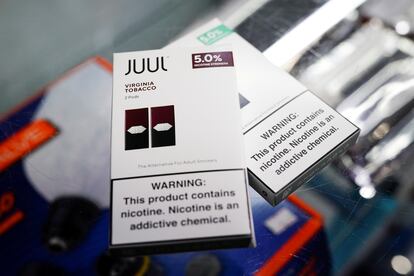Juul to pay $439 million in damages over marketing e-cigarettes to teens
The company used launch parties, giveaways and free samples to lure young adults, who quickly became addicted to their high-nicotine vaping products


The e-cigarette brand Juul has paid a high cost for targeting teenagers in its marketing strategy. The firm will have to pay $438.5 million to 33 states in the United States, as well as Puerto Rico, as a result of a court settlement reached on Tuesday between the two sides.
The plaintiffs claimed Juul was responsible for addicting minors to their high-nicotine vaping products with launch parties, giveaways and free samples. They also pointed to how the company used young models on social media to promote their products. In the United States, the legal age to purchase e-cigarettes is 21, the same age for tobacco.
The multimillion-dollar settlement is just one of many setbacks facing the company, which still has nine separate lawsuits pending and is facing hundreds of personal injury lawsuits brought on behalf of underage users who say they became addicted to the company’s vaping products. What’s more, the US Food and Drug Administration (FDA) banned Juul last June from marketing Virginia tobacco flavored pods and menthol flavored pods at nicotine concentrations of 5.0% and 3.0%. It also ordered the company to remove the products from the market. On July 5, the FDA issued an administrative stay of enforcement of Juul’s Marketing Denial Orders (MDOs). While this review process is pending, the company may continue to sell its products in the United States.
Thirty-three US states and Puerto Rico joined together in 2020 to seek compensation from Juul. The lawsuit was led by Texas, Oregon and Connecticut. William Tong, the attorney general of Connecticut, celebrated the settlement in a statement on Tuesday.
“[Juul] relentlessly marketed vaping products to underage youth, manipulated their chemical composition to be palatable to inexperienced users, employed an inadequate age verification process, and misled consumers about the nicotine content and addictiveness of its products,” he said. “The full public health ramifications of this misconduct are yet unknown. Through this settlement, we have secured hundreds of millions of dollars to help reduce nicotine use and forced Juul to accept a series of strict injunctive terms to end youth marketing and crack down on underage sales,”
Each state will receive a different amount as part of the court settlement. Connecticut, for example, will receive $16.2 million, while Texas will be paid $42.8 million. In addition to the compensation, “the agreement also includes strong marketing, sales and distribution restrictions, including restrictions on marketing to persons under age 35,” as well as “age verification requirements on all sales,” said Texas Attorney General Tom Paxton in a statement.
The $438.5 million will be paid out over a period of six to 10 years. The longer it takes to pay the settlement, the more it will have to pay. It could end up paying $476.6 million if it gets too close to the deadline.
Following the settlement, Juul released a statement calling the deal an expression of its “commitment to resolve issues from the past.” It added: “The terms of the agreement are aligned with our current business practices which we started to implement after our company-wide reset in the fall of 2019.”
Juul, is owned by Altria, which is also the parent company of tobacco brand Phillip Morris. The vaping company burst onto the market, using technology and design to win over customers. It sold itself as the “iPhone of vapers,” and built a niche by targeting young people.
Tu suscripción se está usando en otro dispositivo
¿Quieres añadir otro usuario a tu suscripción?
Si continúas leyendo en este dispositivo, no se podrá leer en el otro.
FlechaTu suscripción se está usando en otro dispositivo y solo puedes acceder a EL PAÍS desde un dispositivo a la vez.
Si quieres compartir tu cuenta, cambia tu suscripción a la modalidad Premium, así podrás añadir otro usuario. Cada uno accederá con su propia cuenta de email, lo que os permitirá personalizar vuestra experiencia en EL PAÍS.
¿Tienes una suscripción de empresa? Accede aquí para contratar más cuentas.
En el caso de no saber quién está usando tu cuenta, te recomendamos cambiar tu contraseña aquí.
Si decides continuar compartiendo tu cuenta, este mensaje se mostrará en tu dispositivo y en el de la otra persona que está usando tu cuenta de forma indefinida, afectando a tu experiencia de lectura. Puedes consultar aquí los términos y condiciones de la suscripción digital.








































